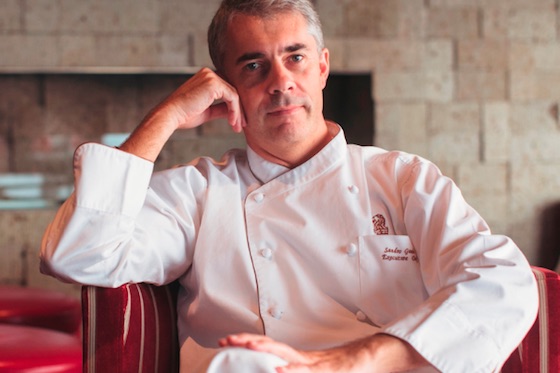“It’s the most demanding city I’ve ever worked in,” says Sandro Gamba. That says something about Shanghai, especially coming from a chef who has lived on four continents and trained under Michelin-starred legends.
The executive chef of the Ritz-Carlton Shanghai Pudong is comfortable with those demands, and he is adapting to the speed at which the city moves. Shanghai’s customers, voracious for new experiences, bore quickly and are never without their camera phones, ready to snap and post an attractive plate. “They are mini-journalists,” Gamba says. It has upped his game a little in terms of presentation, he says, but at one of the top hotels in a city of 24 million people, the pressure is already very, very high.
Gamba, a Frenchman by birth, started cooking when he was 14. He burnished his skills and reputation with Joel Robuchon in Paris and Alain Ducasse in Monaco. Now in his mid-40s, his first passion has always been to develop himself as a chef: “You can work in the business for 50, 60 years, and always grow and always do the same job, but differently.”
That passion played out as he moved to executive chef roles at Lespinasse at the St. Regis in Washington, D.C., and to the Park Hyatt Chicago at NoMI, whose reputation he built into one of the best hotel restaurants in the world, and then to the Four Seasons Westlake Village in California. He rose into corporate roles for the Sofitel brand, where he supervised 200 chefs globally, and for the InterContinental. At the Emirates Palace Abu Dhabi, an opulent Kempinski hotel, he ran more than a dozen restaurants, cafés and lounges. And while appreciation for fine food is universal, he has seen how it plays out on each continent.

In America, he says, it’s about relationship: You find the best, most local sources for food, and you know the names of its producers. Chefs and customers are friends; so are chefs and the media, which likes to elevate celebrities.
“In the Middle East, it’s completely different,” Gamba says. “For sourcing, you can buy whatever you want, but it’s coming from all over the world by airplane.” And while one or two customers are happy to be friends, and fine food is appreciated, people don’t get carried away.
China, though: “China is a completely different monster,” Gamba says with a laugh. The biggest issue, and the most important one for someone who oversees the kitchens of a hotel that Condé-Nast Traveler named the best hotel in the world in 2011, is safety, particularly in a country where scandals and fatalities around tainted, outdated and outright fake foods have made international news. “Fifty percent of my job is finding the right supplier,” he says. But in a city that has amazed him with its progressive moves to cut pollution and energy consumption — he says you have to be careful on the street because you can’t hear the electric cars coming — he sees progress on the food front, as well.
A close second for Gamba is how it all tastes, and for that his mastery of French and diverse cuisines comes into play as he manages four restaurants that serve Italian, Malaysian, Japanese and other specialties. He relishes his role as ambassador of the hotel rather than as a star chef.
He sees stars elsewhere: Michelin stars, to be exact. The restaurant guide is making its first visits to China this year, and Gamba wants to be ready. More than menu refinement, it’s about training his staff and evolving the culture to pursue a prestigious but still little-known award.
In the meantime, he continues to feed the Chinese customer’s enthusiasm for social media: Customers will be able to scan codes next to menu items in the Italian restaurant, Scena, and watch videos of dishes being prepared. It helps that Samba is comfortable around a camera, a passion that he says helps determine his career. “When I want to take a new job, I always ask, what will it do for me as a chef and as a photographer?”
Those twin pursuits have led him around the world. “Before I go to work in a country, I go there to live. That’s very important to how I conduct my career. I live here,” he says of Shanghai. “I’m going to make friends, be in a relationship, go back to my roots. But in a Chinese way.”
